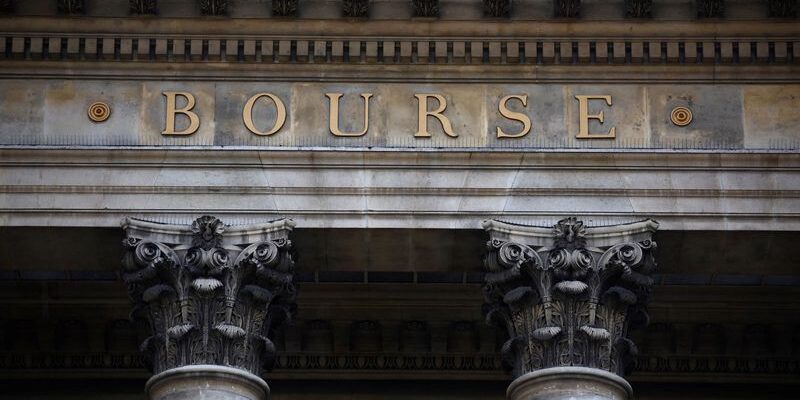by Claude Chendjou
PARIS (Reuters) – Wall Street is expected to fall on Wednesday and European stock markets fell sharply mid-session in a context of risk aversion still fueled by the threat of a default in payment by the United States while macroeconomic indicators of the day are struggling to reassure investors.
Futures on New York indices signal an opening on Wall Street down 0.37% for the Dow Jones, 0.43% for the Standard & Poor’s 500 and 0.45% for the Nasdaq.
In Paris, the CAC 40 fell by 1.81% to 7,245.2 points around 12:00 GMT, to a low of almost two months. In Frankfurt, the Dax dropped 1.7% and in London, the FTSE lost 1.71%.
The pan-European FTSEurofirst 300 index fell by 1.63% and the EuroStoxx 50 in the euro zone by 1.77%. The Stoxx 600, down for the second consecutive session, lost 1.71%, to a low of almost three weeks.
Democrats and Republicans on Tuesday wrapped up a new round of negotiations on raising the debt ceiling without reaching an agreement as the June 1 deadline draws near, which exacerbates caution in the markets. Added to this are expectations around the minutes of the last meeting of the monetary policy committee of the US Federal Reserve (Fed) which will be published at 6:00 p.m. and could provide clues on the path of interest rates.
In the day’s indicators in Europe, disappointment prevails after a core inflation index in the United Kingdom at its highest since 1992 (+6.8% over one year in April) and a business climate in Germany, measured by the Ifo index, down in May, to 91.7 after 93.4 in April.
WALL STREET VALUES TO FOLLOW
Kohl’s climbed 11% in pre-market after posting a surprise first-quarter profit, thanks to tighter inventory and cost management.
Abercrombie & Fitch gained 20% in pre-market after raising its forecast for annual turnover, the group betting on a constant demand for its clothing and accessories despite the impact of inflation.
VALUES IN EUROPE
All the main compartments of the rating in Europe are in the red, with transport and leisure (-2.67%) posting the largest decline, alongside cyclical sectors such as the automobile (-2.24%) and the banks (-2.49%).
Deutsche Bank, HSBC fall 2.44% and 2.962% respectively as the CMA, the UK competition and markets authority suspects these two banks and three others in North America of collusion on the market bond.
The luxury compartment, which fell heavily on profit taking on Tuesday, lost another 1.84%, falling to a seven-week low. LVMH (-1.85%), Kering (-2.37%), Richemont (-2.56%) and Burberry (-3.80%) are in the red.
Side corporate results, Marks & Spencer jumped 12.59%, the British distributor having returned to the dividend and signaled that its recovery was beginning to bear fruit. The insurer Aviva, on the other hand, fell by 5.28% after the publication of its quarterly accounts.
The Swedish game group Embracer plunged 43.03% after the announcement of the failure of a strategic partnership and the revision downwards of its adjusted profit forecast for the whole of the year.
CHANGES
The dollar, which touched a two-month peak on Tuesday against a basket of benchmark currencies, took another 0.1% on Wednesday, taking advantage of its status as a safe haven asset in a context of risk aversion.
The euro was virtually unchanged at $1.0778, while the pound fell 0.12% to $1.2395 after the UK inflation data.
The New Zealand dollar (-1.7%) is affected by the surprise decision of the New Zealand central bank which declared that it was done with the increase in the cost of credit after a key rate raised to 5.5%, at its highest for 14 years.
RATE
The ten-year German Bund yield fell three basis points to 2.421%, reacting to the Ifo indicator. It rose earlier in the morning to 2.501%, the highest since the end of April following the publication of data on British inflation above expectations.
The yield on ten-year US government bonds fell about two points to 3.6728%.
OIL
Oil prices are supported by a decrease in crude inventories in the United States last week and the warning of the Saudi Minister of Energy on short sellers: Brent is up 1.48% to $77.98 on barrel and US light crude (West Texas Intermediate, WTI) 1.66% to 74.12 dollars.
NO MORE ECONOMIC INDICATOR ON TODAY’S AGENDA
(Written by Claude Chendjou, edited by Kate Entringer)
Copyright © 2023 Thomson Reuters
